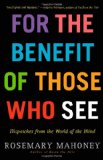Summary | Excerpt | Reviews | Beyond the Book | Readalikes | Genres & Themes | Author Bio

Dispatches from the World of the Blind
by Rosemary Mahoney
*No, not just a little—a lot. A few years before this event I had seen for the first time the film version of All Quiet on the Western Front. One scene had stayed vividly in my mind: In the midst of a relentless bombardment, a band of German soldiers are putting up barbed wire to keep the enemy at bay. The younger ones are wild-eyed with fear. The bombardment worsens, and the soldiers are directed to retreat to their dugout. As they go, one of them gets knocked to the ground by an explosion and the next thing we know he is screaming hysterically, "My eyes! My eyes! I can't see! I'm blind!," and running around in jagged circles. The very next thing we know, he's dead. It isn't entirely clear what has killed him, but I think we're meant to suppose it's the injuries he sustained. I knew better, though. I knew in my heart that the soldier had died not of his injuries but of the sheer horror at knowing he'd been blinded. I had felt his utter despair, his psychic repulsion, so forcefully that I frowned at the television screen and said out loud, "It's better that he died."
This extreme attention to visual detail is not a virtue, just a fact of my person. It happens seemingly involuntarily and strikes me as neither good nor bad. Possibly (because I don't seem to be able to control it) it's a neurosis. Or maybe it's just evidence that I am at heart a shallow person who can't help fixating on inconsequential surface details. Certainly it's superfluous. It doesn't help me at all, I don't need it to survive, and yet my eyes are always searching for information. I will spot an acquaintance on the street, a friend in the supermarket, an old classmate on a subway long before he or she has spotted me. I always remember a face. If I meet a person once, I will remember the face four years later, remember where I first met the face, what other faces were present, and what was the mood of the meeting. I will likely not recall the name, but the face I will remember.
But seeing and noticing aren't a function of the eyes alone. They are as much a function of the mind, and in my case, perhaps they aren't as involuntary or superfluous as I tend to think. On further consideration, I suspect that my mind could not really operate without my eyes, because in fact it is my mind that is constantly asking questions of the visual world, looking for evidence, for information, judging existence on the basis of what I see. In me, it's a kind of tireless vigilance and possibly even a defense. I am like a security camera ever on the watch. The furtive quality of vision feels to me like an incredibly valuable weapon. Everything I see gets transformed into a private sketch or painting in my mind, stored away for future reference, future evidence, future ammunition. I fear that my mind would starve and that I might find myself in danger if I had no visual information, that it's chiefly the light, the shapes, the spaces, the colors that I see that compel me to keep moving forward in life and that keep me safe. The first time I read John Berger's Ways of Seeing, I was struck by the sentence We only see what we look at. I believe that what Berger meant by this was We see only what we look at. But the sentence seems to me as significant in its other interpretation: We, alone, know what we are looking at. Unless some keen witness is watching every movement and focus of your eyes, you alone know what you choose to see and perceive. The employment of vision is private and even covert. And, of course, the beholder chooses not only what he will look at but what he will make of what he sees.
Lying in my bed that terrible night thirty years ago, I concluded that being blind was worse than being dead. Being blind was like lying alive within a locked coffin. I'd be trapped and hidden in that dark box but able to hear the world outside carrying on entirely without me. Blind, I'd be left behind. I would want to hammer on the lid of the coffin and shout, For Christ's sake, let me out! but my arms would be pinned to my chest in that tight space and all I'd be able to do was scream. But the screaming would get me nowhere. I'd be imprisoned that way for the rest of my pointless life, conscious of my predicament and helpless to change it.*
Surely being blind was like being buried alive. I was certain then that I would rather die than lose my eyesight.
Excerpted from For the Benefit of Those Who See by Rosemary Mahoney. Copyright © 2014 by Rosemary Mahoney. Excerpted by permission of Little Brown & Company. All rights reserved. No part of this excerpt may be reproduced or reprinted without permission in writing from the publisher.
Your guide toexceptional books
BookBrowse seeks out and recommends the best in contemporary fiction and nonfiction—books that not only engage and entertain but also deepen our understanding of ourselves and the world around us.